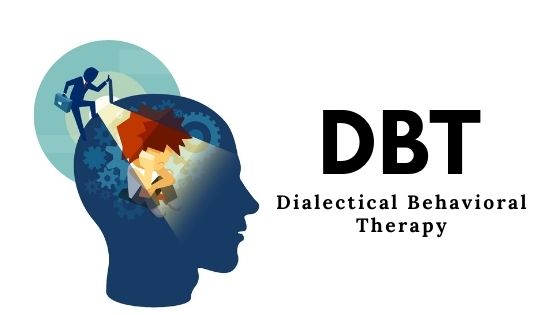Navigating Emotional Health: Study DBT London's Strategy
Navigating Emotional Health: Study DBT London's Strategy
Blog Article
Using the Power of Dialectical Behaviour Treatment (DBT) Providers for Sustainable Emotional Equilibrium and Improved Relationships
In a globe where psychological well-being and preserving healthy connections are essential elements of a satisfying life, the utilization of Dialectical Behavior Treatment (DBT) solutions has emerged as a beacon of hope for lots of people. The structured and evidence-based strategy of DBT supplies a path towards sustainable emotional equilibrium and enhanced communications with others.

Recognizing the Core Principles of DBT
Dialectical Behavior Treatment (DBT) is started upon a set of core principles that underpin its restorative strategy to advertising emotional balance and psychological well-being. One of the basic concepts of DBT is dialectics, which highlights the synthesis of relatively opposite concepts to come to a more balanced perspective. This involves acknowledging and approving the oppositions and stress within oneself, bring about a better sense of harmony and understanding. Mindfulness is another core concept of DBT, concentrating on being completely present in the minute without judgment. By cultivating mindfulness, individuals can develop a heightened awareness of their emotions, thoughts, and habits, enabling for greater self-regulation and emotional control.

Recognition is additionally important to DBT, stressing the relevance of accepting and acknowledging one's experiences and feelings as legitimate. By integrating these core principles into therapy, DBT uses a thorough and efficient method to promoting emotional well-being and psychological resilience.
Establishing Emotional Regulation Skills
Emotional law abilities are important components of Dialectical Actions Treatment (DBT) that make it possible for people to effectively handle their emotions and browse challenging circumstances with resilience. These skills encompass the capacity to identify and comprehend one's emotions, tolerate distress, manage intense feelings, and act based on personal values also in the face of emotional turmoil. Creating emotional policy abilities involves discovering mindfulness techniques to remain existing in the minute, understanding the triggers that bring about emotional dysregulation, and carrying out coping strategies to modulate emotional reactions.

Enhancing Interpersonal Effectiveness
Improving communication abilities and cultivating significant links with others are indispensable elements of creating interpersonal effectiveness within the framework of Dialectical Actions Therapy (DBT) DBT teaches individuals how to interact successfully, navigate social challenges, and develop techniques for solving disputes in a constructive fashion.
One secret component of boosting social effectiveness in DBT is finding out to acknowledge and manage emotions in social interactions. DBT London. By raising emotional awareness, individuals can react to others in a much more empathetic and understanding means. Furthermore, DBT emphasizes the significance of exercising mindfulness in interpersonal connections, urging people to be present in their communications and fully engage with others
Practicing Mindfulness Techniques
Creating a regular mindfulness method is vital for people going through Dialectical Behavior modification (DBT) to cultivate psychological law and improve their social effectiveness. Mindfulness methods, a core part of DBT, entail taking notice of the existing minute without judgment. Through mindfulness, individuals can come to be more conscious of their ideas, emotions, and bodily sensations, permitting them to react to scenarios with higher quality and control.
One key mindfulness technique utilized in DBT is mindfulness meditation. This method includes concentrating on the breath or a particular item while recognizing and allowing go of any kind of disruptive thoughts. By incorporating mindfulness meditation into their daily routine, individuals can educate their minds to stay present and decrease reactivity to stressors.
Another essential facet of practicing mindfulness in DBT is the idea of radical acceptance. Radical acceptance involves fully accepting truth as it is, also when it is difficult or unpleasant. By approving the present moment without judgment, individuals can reduce their suffering and include positive adjustment.
Using DBT Methods in Life
Building upon the read foundation of mindfulness techniques such as reflection and radical acceptance, individuals can incorporate DBT approaches into their every day lives to cultivate psychological equilibrium and enhance their interpersonal abilities. One efficient DBT approach is using dialectics, which encourages people to find the center ground between two opposing ideas or emotions. By practicing dialectics in day-to-day interactions, individuals can find out to validate their own feelings while additionally considering the viewpoints of others. An additional crucial DBT skill for day-to-day life is distress tolerance, which involves finding out just how to manage intense feelings without considering dangerous habits. This can be achieved with techniques such as self-soothing activities, interruption strategies, or improving the minute. Additionally, social effectiveness skills taught in DBT can aid people connect their read what he said requirements assertively, established boundaries, and preserve healthy partnerships. By regularly using these DBT strategies in day-to-day live, people can experience lasting emotional balance and improve their general well-being.
Conclusion

Emotional policy skills are crucial parts of Dialectical Habits Therapy (DBT) that make it possible for people to successfully manage their emotions and navigate challenging situations with resilience.Via DBT solutions, people can cultivate a deeper understanding of their emotions, identify patterns of actions that add to emotional distress, and obtain functional tools to regulate their feelings constructively.Creating a constant mindfulness method is essential for people undergoing Dialectical Actions Therapy (DBT) to cultivate psychological regulation and improve their interpersonal effectiveness.Building upon the foundation of mindfulness methods such as reflection and radical acceptance, people can integrate DBT methods into their daily lives to cultivate emotional equilibrium and boost their interpersonal skills. By recognizing the core principles of DBT, developing psychological guideline skills, improving interpersonal effectiveness, practicing mindfulness techniques, and using DBT techniques in everyday life, people can experience substantial enhancements in their overall health and relationships.
Report this page